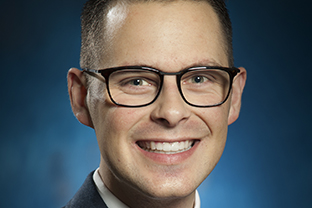December 18, 2020
Four SVSU students qualify for moot court nationals in January
 Members of Saginaw Valley State University’s nationally-ranked moot court program continued to demonstrate their commitment to hard work as four students recently qualified to advance to a national tournament in January.
Members of Saginaw Valley State University’s nationally-ranked moot court program continued to demonstrate their commitment to hard work as four students recently qualified to advance to a national tournament in January. Two SVSU teams featuring two students each – Erik Byron and Collin Willette as well as Justin Weller (pictured) and Caroline Sawatzki – will compete in the American Moot Court Association national tournament, which will be hosted virtually from Jan. 22-24.
The students earned their place in the 200-student competition based on their performance this year in virtual regional tournaments. They faced some of the top moot court programs in the U.S., including Duke University, Cornell University, University of Chicago, Patrick Henry College, as well as William & Mary university.
SVSU’s moot court team is ranked No. 16 in the nation. Julie Keil, the SVSU associate professor of political science who serves as the team’s co-adviser, said this year’s competition was especially challenging considering the pandemic-related obstacles.
“This has been the most difficult year, with the pandemic, a virtual class and tournaments, and the various stresses on the students and (team co-adviser) Amy Hendrickson and myself,” Keil said.
“The fact we were able to qualify two teams during this year is a testament to the strength of the program and the hard work and dedication of the students.”
Two of the qualifying students are familiar with the national tournament. Weller, a political science major from Bay City, qualified twice before. He won a fourth-place brief writing award during the 2020 nationals. He submitted another brief with Byron this year; the results of that competition will be revealed during the January nationals.
Byron, a political science major from Birch Run, qualified once before for the national tournament.
Sawatzki is an electrical engineering major from Saginaw. Willette is a political science major from Bay City.
Acting as teams of two attorneys, students competing in moot court tournaments are tasked with arguing both sides of hypothetical legal cases based on real-life courtroom battles. The competition is judged based on the clarity of the students' argument, their public speaking skills, their ability to answer questions, and how well they know the law and the case.
For more information about the American Moot Court Association, go to amcamootcourt.org.
